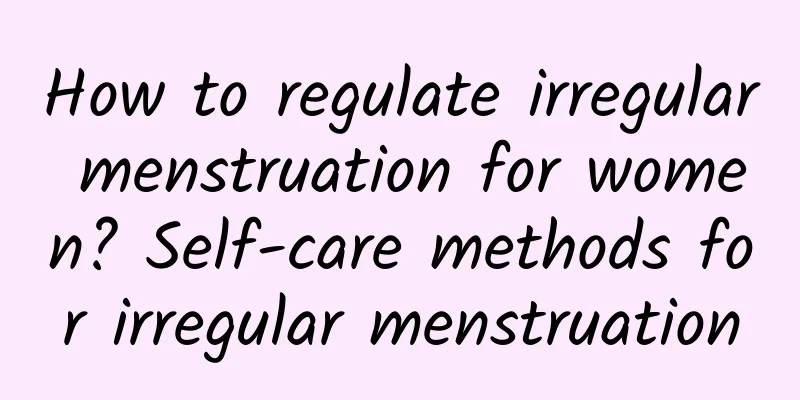How to regulate irregular menstruation for women? Self-care methods for irregular menstruation

|
During menstruation, women's resistance is reduced, their mood is easily fluctuating, and some people may experience symptoms such as poor appetite, backache, fatigue, etc. In addition, common menstrual diseases such as dysmenorrhea and menstrual disorders also seriously affect women's physical and mental health. How can we take care of ourselves to relieve the symptoms of irregular menstruation and menstrual discomfort? 1. What factors are likely to cause irregular menstruation? According to experts, there are several types of symptoms for irregular menstruation. Abnormal menstrual cycle: A menstrual cycle of more than 40 days is called oligomenorrhea, which is often related to polycystic ovarian cysts, or due to malnutrition and excessive exercise. A menstrual cycle of less than 21 days is called frequent menstruation, which may be related to tuberculosis. Normal menstrual cycle, abnormal duration: Long menstrual period may be due to incomplete corpus luteum atrophy, adenomyosis, endometrial hyperplasia, cervical polyps, erosion or cancer. Short menstrual period may be related to tuberculosis or uterine damage after abortion. If the menstruation lasts for 1-3 months and there are abnormalities, ultrasound examination and endocrine examination are required. If it is normal within 1-3 months, no examination is required. Experts suggest that irregular menstruation is related to many factors such as weather, mood, and endocrine system. Women during menstruation need to adjust their mentality to ensure a peaceful period. 2. What are the causes of dysmenorrhea? Dr. Tan Xianjie pointed out that dysmenorrhea is generally divided into primary dysmenorrhea and secondary dysmenorrhea. Primary dysmenorrhea refers to those who have no obvious abnormalities in the pelvic organs after a detailed gynecological clinical examination, while secondary dysmenorrhea refers to those who have obvious lesions in the reproductive organs, such as endometriosis, pelvic inflammatory disease, tumors, etc. Unmarried women with primary dysmenorrhea can take oral painkillers to relieve the symptoms, and women of marriageable age can also relieve the symptoms after giving birth. Secondary dysmenorrhea requires the identification of specific symptoms, and the symptoms can be relieved after auxiliary drugs or surgical treatment. 3. What are the principles of self-care during menstruation? 1. Eat in moderation: During menstruation, due to the dissipation of menstrual blood, more nutrition is needed; the diet should be light and mild, easy to digest, and avoid eating too much raw and cold food, because coldness causes blood to coagulate, which can easily cause dysmenorrhea, excessive menstruation or sudden interruption, etc. Avoid eating too much spicy and dry food that damages body fluids. To reduce uterine bleeding, drink more boiled water, eat more fruits and vegetables, and keep bowel movements smooth. 2. Cleanliness and hygiene: Keep the vulva clean during menstruation. Scrub the vulva with warm water every night. Do not take a tub bath or a sitz bath. It is better to take a shower. Sanitary napkins and paper should be soft and clean, and it is best to sterilize them under high pressure. |
>>: How to treat irregular menstruation at the age of 14? 4 basic symptoms of irregular menstruation
Recommend
The main reason for ectopic pregnancy
Ectopic pregnancy is a common gynecological disea...
What foods are best for women with cervicitis? Five types of foods that women with cervicitis cannot miss
Female cervicitis is usually caused by the prolif...
What can I eat to eliminate uterine fibroids? Is it good to have sex frequently when I have uterine fibroids?
What to eat to eliminate uterine fibroids Uterine...
Lichen sclerosus is one of the types of vulvar leukoplakia
The main symptoms of vulvar leukoplakia are tingl...
What are the classifications of pelvic effusion?
What are the classifications of pelvic effusion? ...
Expert introduction: What are the classifications of vaginitis?
There are several main classifications of vaginit...
Main methods of diagnosing vulvar pruritus
Vulvar itching is a very painful thing for women,...
What is the best diet to fight against malignant uterine fibroids? Can malignant uterine fibroids be cured?
What is the best diet to fight against malignant ...
How to make a girl's Bartholin's gland cyst disappear slowly
Treatments for Bartholin's gland cysts includ...
Edema is not just caused by eating too much salt, the timing of drinking water is also important! Get rid of 6 bad habits and get rid of edema
Many people are worried that water retention in t...
How are uterine fibroids induced? What are the methods to prevent uterine fibroids?
What causes uterine fibroids? Uterine fibroids ar...
Subserosal uterine fibroids treatment method Can subserosal uterine fibroids be treated with surgery?
If a woman suffers from subserosal uterine fibroi...
Can eating more guava help diabetics stabilize blood sugar? Nutritionist teaches you how to eat...
Questions often seen on the Internet include: &qu...
What are the factors that cause ovarian cysts?
Ovarian cysts are not unfamiliar to women, but du...
Can you get pregnant if your endometrium is thick?
Excessive thickness of the endometrium may affect...









